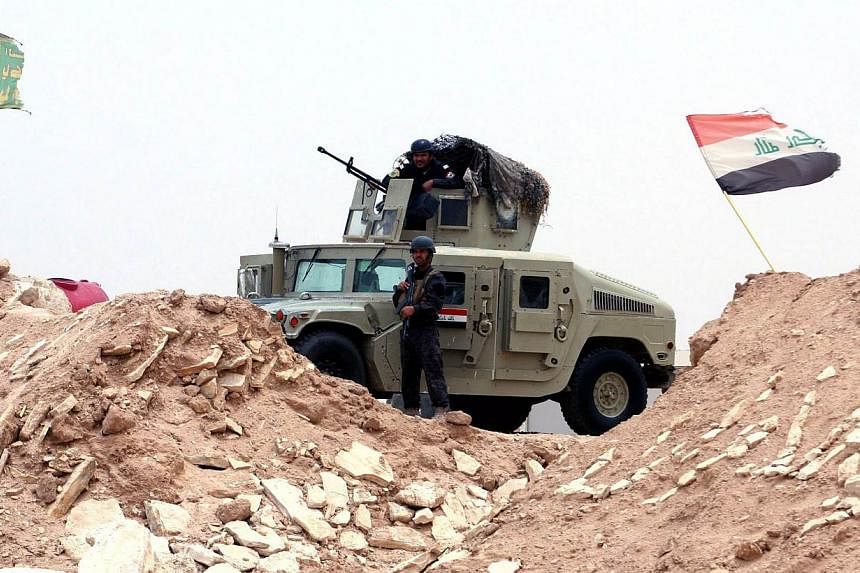PARIS (AFP) - United States-led coalition members carrying out air raids against Islamic State in Iraq and Syria (ISIS) jihadists held crunch talks in Paris on Tuesday as Iraq's leader pleaded for more support against what he said was now a foreign-dominated group.
Prime Minister Haider al-Abadi said the advance of ISIS jihadists represented a "failure" for the global community, upping the stakes ahead of the gathering of around 20 ministers from the coalition.
The talks were given added urgency by a suicide bomb against an Iraqi police base, which killed at least 37 and further slowed an operation to retake the city of Ramadi near Baghdad.
Iraq's plan to recapture Ramadi will dominate the meeting, according to a senior US official, with Abadi set to outline how his government intends to retake it and what coalition partners can do to help.
"This is not a business-as-usual meeting," said the senior official, speaking on condition of anonymity by teleconference.
"We're coming to discuss with... Abadi his plan for liberating Ramadi and Anbar province." And just hours before the meeting, Abadi stressed that ISIS was not just a problem for Iraq and Syria, where the Islamic group has overrun large parts of territory, but the whole world.
"The flow of foreign fighters is more than before," he told reporters in Paris before the meeting started.
"There is an international problem, it has to be solved." He said that up until recently, around six out of 10 fighters were Iraqi and the remainder foreign, whereas now the proportion was reversed.
"Daesh is creating a new generation of fighters, dedicated, ideologised. They are prepared to die but they are not suicide bombers," said the prime minister, using an alternative name for ISIS.
The international community has to explain "why so many terrorists are from Saudi Arabia, why so many from the Gulf, why so many from Egypt, why so many from Syria, and Turkey and from European countries?"
World's 'failure'
Abadi issued a desperate plea for more international support in the wake of significant battleground gains by the group in Iraq and the conquest of Ramadi.
"There is a lack of intelligence, we are trying very hard on our part but this is a transnational organisation," Abadi stressed.
"It needs all the support of the world, we are not getting much. I think this is a failure on the part of the world ... There is a lot of talk of support for Iraq, there is very little on the ground." He said Baghdad was in need of weapons and ammunition to battle IS, adding that most of the country's weapons contracts were with Russia or Iran, both under Western sanctions.
"We are not asking for arms, but please let us purchase arms easily," he pleaded.
Western diplomats say the aim of the Paris meeting is to shore up support for Abadi as Iraq comes under international pressure to bring the Sunni minority into the fold.
Under a campaign plan adopted by Abadi's cabinet shortly after Ramadi's fall, the Iraqis hope to mobilise the Sunni tribes of Anbar province, deploy police units under new leadership, channel reconstruction aid quickly to recaptured areas and ensure all Shiite militias are operating under Baghdad's authority.
'Mostly policemen' dead
Meanwhile, on the ground, the situation showed little sign of improvement as a suicide bomber blew up his explosives-laden vehicle at a police base in Iraq's Salaheddin province, killing at least 37 people and wounding more than 30.
The dead were "mostly policemen", said a doctor at the main hospital in the nearby city of Samarra where the casualties were taken.
Some police officers said the suicide attacker used a tank to force his way into the police base, located between Samarra and Tharthar lake, northwest of Baghdad.
A military operation aimed at cutting off the Islamic State group's supply lines in Anbar province of western Iraq is going on in the area.
ISIS fighters have in the past year seized a formidable arsenal of military vehicles, weapons and ammunition from retreating Iraqi forces.
The jihadists' latest haul of gear came on May 17 when Iraqi forces fled and they captured Ramadi, the capital of Anbar.
The debacle prompted Abadi to call on the Hashed al-Shaabi, an umbrella organisation which includes Iran-backed Shiite militias that Baghdad and Washington had been reluctant to involve in the Sunni bastion of Anbar.
Iraqi forces launched a counteroffensive but have either stopped on the outskirts of Ramadi or focused efforts on severing the jihadists' supply lines.
Coalition strikes have helped Iraqi forces regain ground from ISIS, but the fall of Ramadi was a stark illustration of the limits of air power in the absence of effective forces on the ground.
The jihadists' capture of the city coincided with their takeover of Palmyra in Syria, in what appeared to swing the momentum in the jihadists' favour after months on the back foot there.
Geographer and analyst Fabrice Balanche said that across Iraq and Syria, the jihadist group now controls nearly 300,000 square kilometres, an area the size of Italy.

